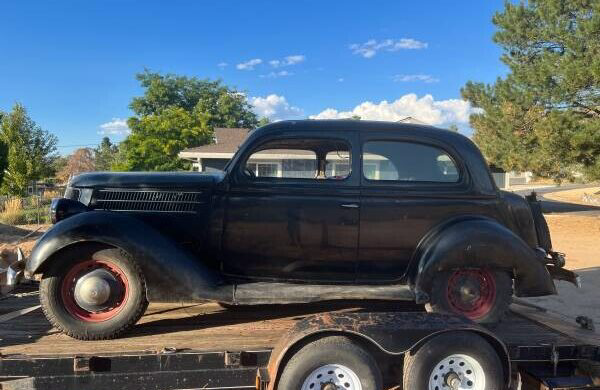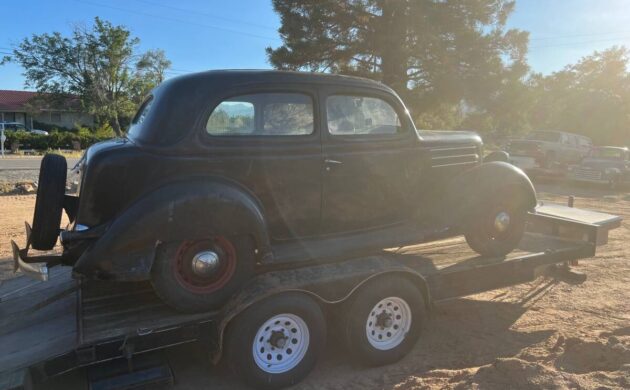As time goes on, more and more older restorations are advertised as original. There are always unscrupulous sellers out there, but many legitimately believe that the vehicle they are selling still wears the original finish and parts from the factory. Take for example this 1936 Ford tudor touring sedan for sale on Craigslist in Carson City, Nevada. It is advertised as possibly having the original paint and interior. That may be correct, but how can a prospective buyer tell? Is the advertised asking price of $8,000 for this Flathead Ford with 80,000 miles on the odometer out of line? Thanks to Fred B. for the tip!
For those of you without a calculator handy, 1936 was a whopping 87 years ago. That is a long time for interior material and paint to last even in ideal conditions. That is also a whole lot of opportunities for the sun, varying temperatures, insects, and rambunctious crumb snatchers to work their magic on what was sold as an economy car. Occasionally cars come out of hiding with an interesting story that explains their great condition. Many cars in this category end up in the Antique Automobile Club of America‘s HPOF class. These cars, when displayed are recognized for being largely original. Vehicles like this are prized by researchers who are interested in documenting how cars came off the assembly line so future restorations can be made to match exactly.
When a car is submitted for HPOF judging, there are expert judges available that can verify the owner’s claims. This is not the case with a Craigslist, Facebook Marketplace, or eBay ad. Prospective buyers have to carefully analyze the published photographs, dissect the seller’s claims, and do a deep dive into the specifications of the vehicle in question. Or hire an expert to look at the car if the interest is high enough. Many times, this is the only sane option, given that our communications are now global, and we have gone far beyond a thirty-word ad in Hemmings Motor News. It is an investment in funds, but a wise one of a prospective buyer is serious. Buyer’s remorse is a negative force in a large percentage of vintage car transactions.
The car seen in these pictures, which have been edited for formatting reasons, may be an older restoration. To what degree that restoration was completed and to what exactness is difficult to determine due to the quality of the photographs and bare-bones description in the ad. The shine on the paint, the material used for the door panels, and the later engine point to this car having had some work done in the past that altered its originality. The wheels, however, are a very strong indication that this car still wears its mechanical brakes. These were often replaced with later Ford hydraulics, but that required different wheels to match the later hydraulic hubs.
Once again, this is another case where better pictures and a more detailed ad might sell the vehicle quicker. It is also one of these situations where the originality is hard to determine without a detailed in-person inspection. The other factor to consider is the price. With prewar closed car prices falling, what is the market value of a fairly solid but worn Flathead Ford tudor with a trunk back body? This is not a bad car and could be a nice cruiser when brought back up to worthy condition. The problem is that running and driving more presentable examples are out there for not a lot more. Hopefully, this car finds a good home, original or not.
Do you think this car is at least partly original? Does that make a difference in the value at this point? Please share your thoughts in the comments.











It’s only $4000
Now, the asking price, per the ad, is $70,000. Sort of a big markup, over current prices, for the condition.
Still $7,000 per the top of the ad. Still to much for not much.
Note the custom body work done to the rear fenders, the top wheel opening has been filled in to give a flat half opening. What else has been done to the car that we can’t see.